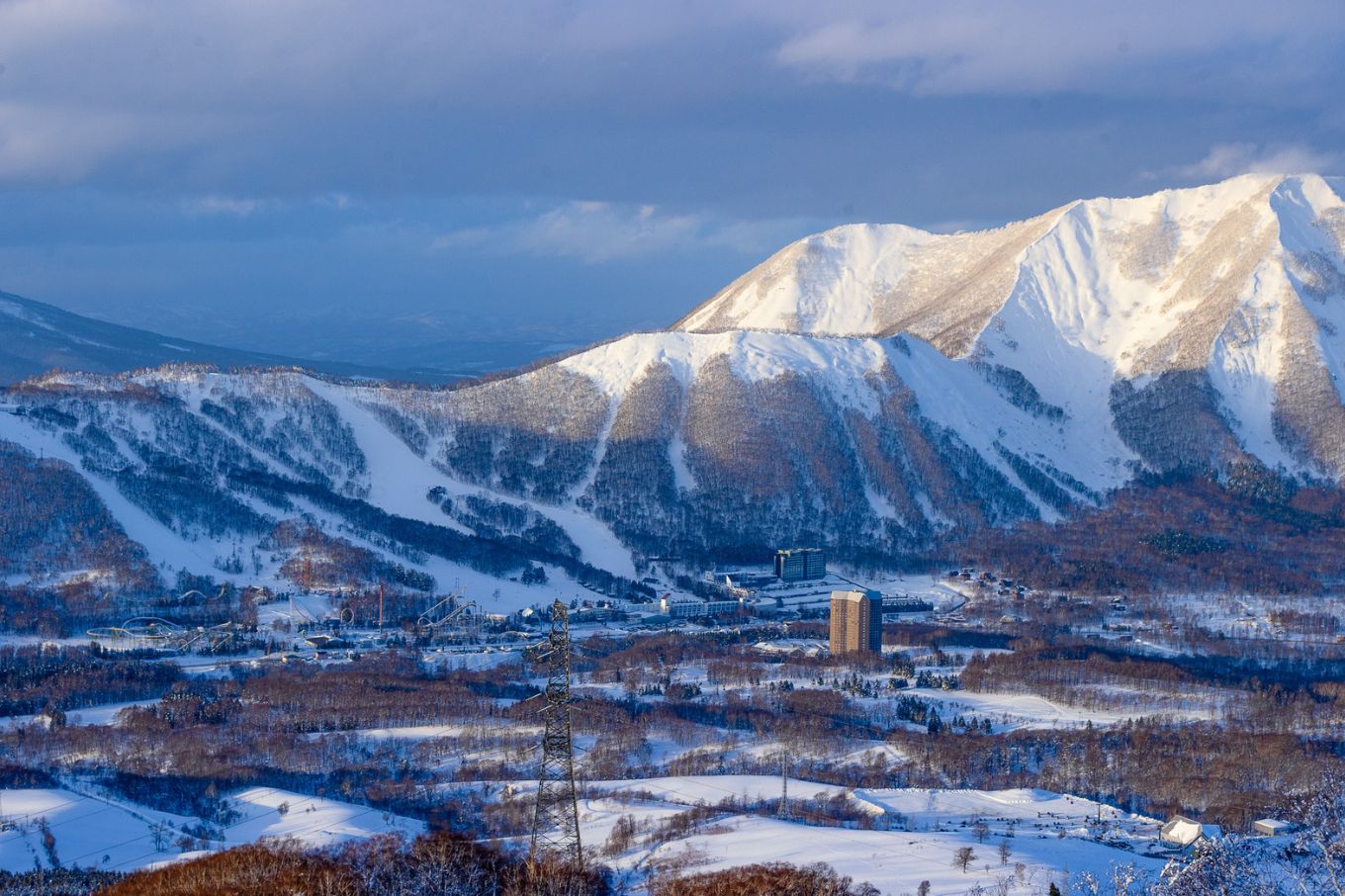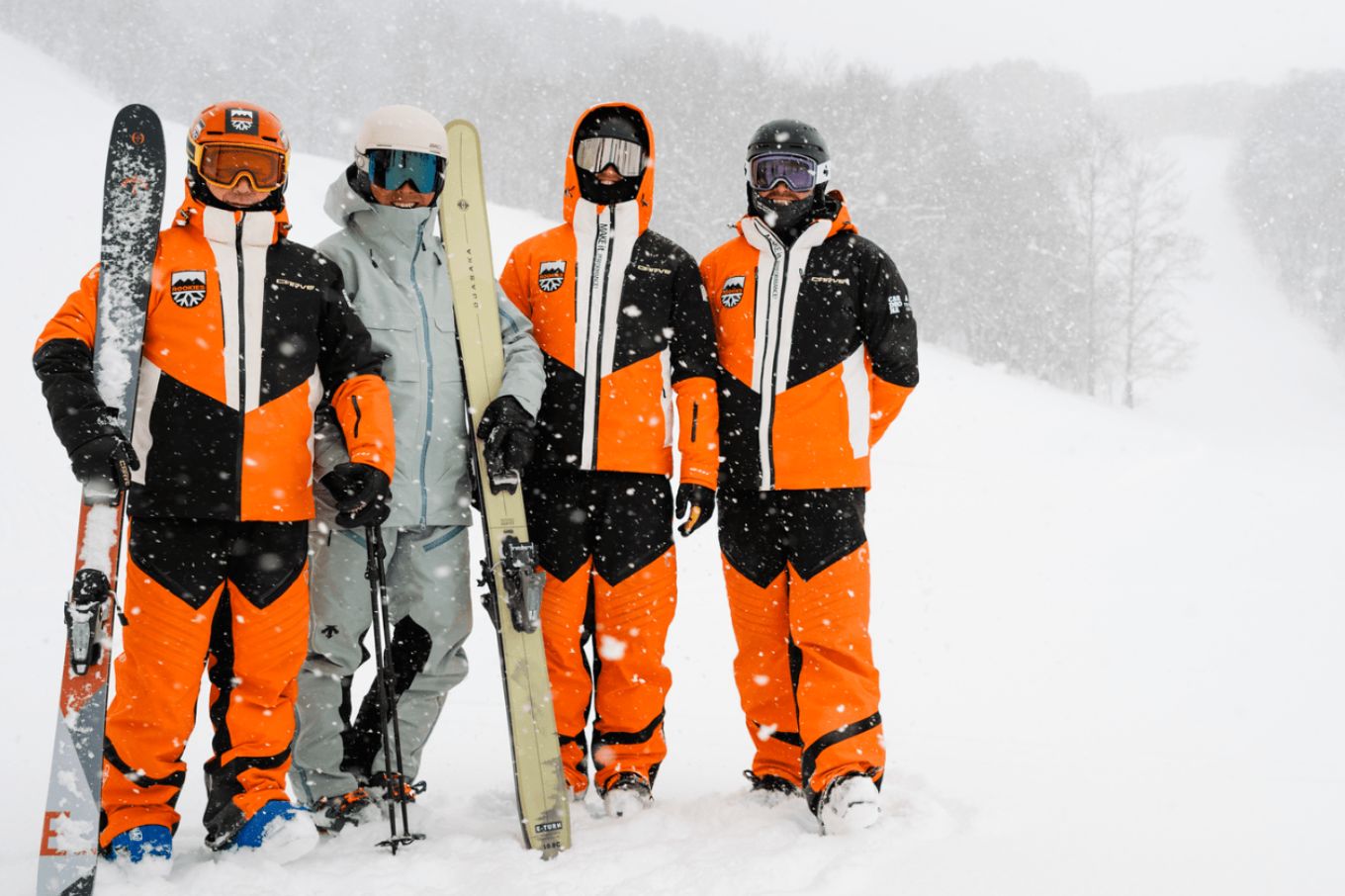Kusatsu Japan's most amazing onsen ski town
Japan has so many onsen ski towns, but Kusatsu is different. Where else does a huge flow of thermal water power through the main plaza right in the centre of town? Measured at 32,300 litres per minute it’s rated Japan’s “most bountiful spring”. Called ‘Yubotake’, the ‘Hot spring field’ in the centre of town looks equally amazing by day or lit up at night.
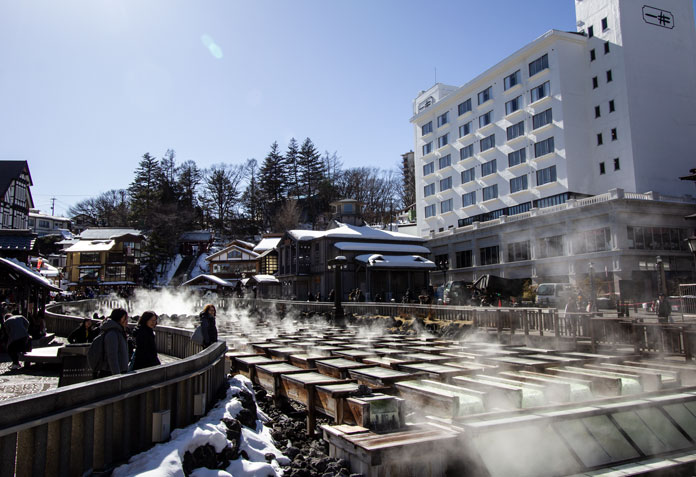
Kusatsu’s ‘Yubotake’ – Hot Spring Field – is Japan’s largest hot spring © Carmen Price
The rain or snowmelt from Mt Shirane above the town takes 30 years to seep through the ground, gathering minerals and being heated by the magma layers of the active volcano (very active – more on that later!) to emerge as high ph value therapeutic natural hot spring water.
Locals and visitors have been taking advantage for centuries, with a funky method of cooling the waters down to a bearable temperature.
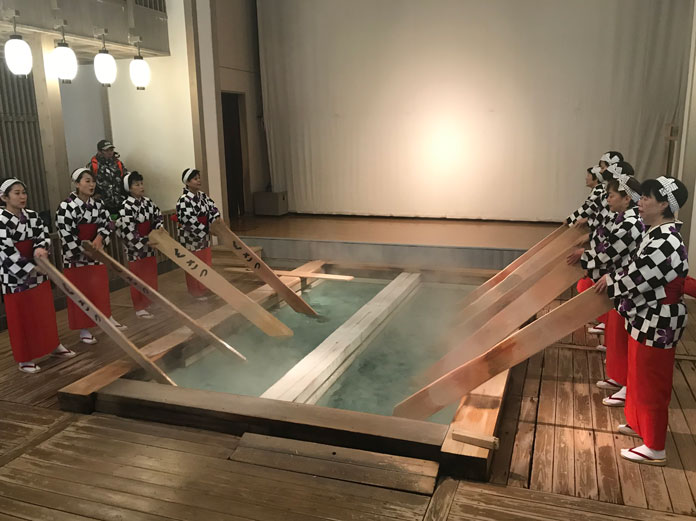
The paddle pop stick “Yumomi” onsen cooling method works a treat; you can see the show and participate © Carmen Price
Called “Yumomi” this involves a team of beaters who smash and lift the water into the air in unison with big flat paddle sticks while singing a song to keep the rhythm – you can go and watch and learn how free next to the tourist info booth right on the main square.
View this post on Instagram
The plaza area around the springs is a hive of activity, as of course Kusatsu is a very popular tourist attraction for locals and international visitors alike.
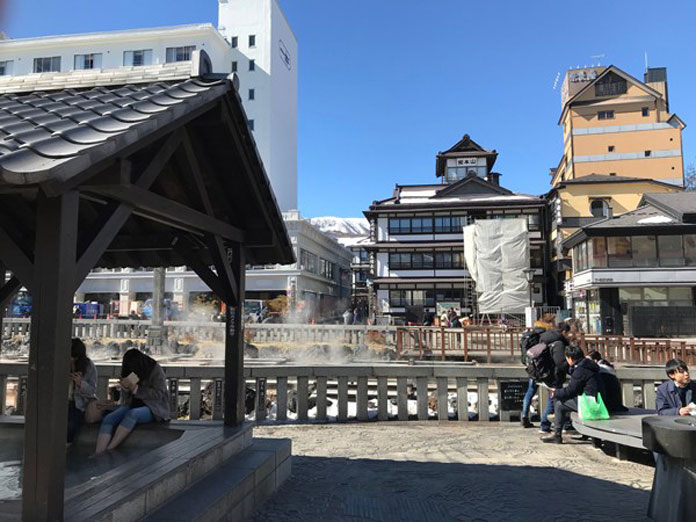
Ease your aching feet at Kusatsu’s central foot spa © Carmen Price
There are foot spas next to the main flow in the plaza, and 19 free public onsen in and around the central area.
Because it’s popular year round everything looks bright and busy, with some excellent affordable restaurants and nice shops. Unlike other onsen areas which have become quite run down in parts and can be a bit depressing to visit as a result, at Kusatsu it’s full steam ahead.
The town is hilly but pretty compact and pedestrian friendly to wander round. Don’t miss the beautiful Sainokawara Park forest walk down from just below the base of the ski area to the back of town. The big Sainokawara Rotenburo outdoor onsen are a must stop at on the way down, only Y600 and well worth it. There are plenty of zen spots along the walk to stop and listen to the rushing water as you follow the steaming stream.
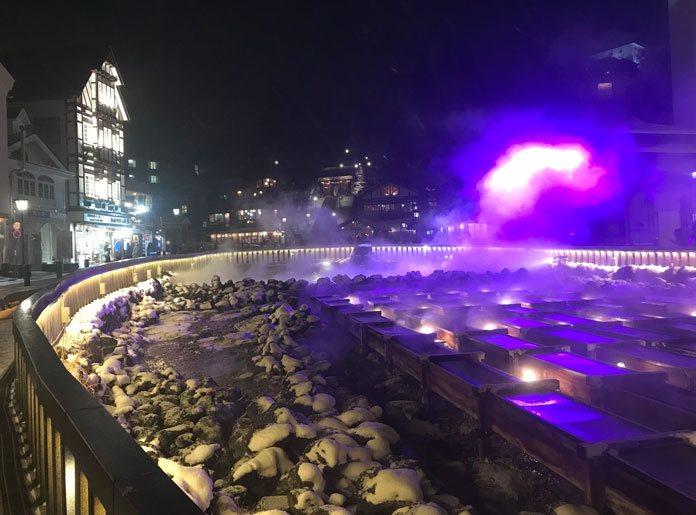
Kusatsu at night © Carmen Price
The skiing at Kusatsu Kokusai Resort
Despite how great the onsen and town are, most western skiers knew nothing about the ski area above the town. Then suddenly it shot to worldwide fame hitting TV news and social media around the globe on January 23rd when the Kusatsu-Shirane volcano erupted without warning, showering a hail or rocks and ash onto the gondola and upper runs at the ski area. Several people riding the gondola were injured as a result, and tragically one member of a Japanese Self Defense Force team training nearby was killed.
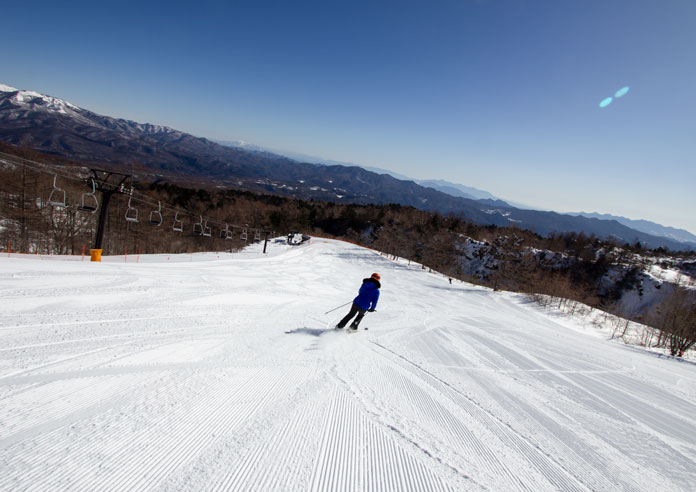
Kusatsu Kokusai ski resort offers uncrowded cruising and family runs © Owain Price
We were locked in to visit just a couple of weeks later, our worst timing since taking a group of travel agents to Mt Ruapehu a few days after it erupted back in 1996. Yet in just over two weeks it was as though nothing had happened. The volcano wasn’t even smoking anymore, the slopes were dazzlingly white.
Obviously the gondola and upper mountain area remained closed, but we caught up and skied with a young patroller, Harunobu Takahashi, who was part of the rescue effort. Still traumatised by the experience, he explained how they organised the rescue and got everyone down safely, apart from the unfortunate JSDF guy.
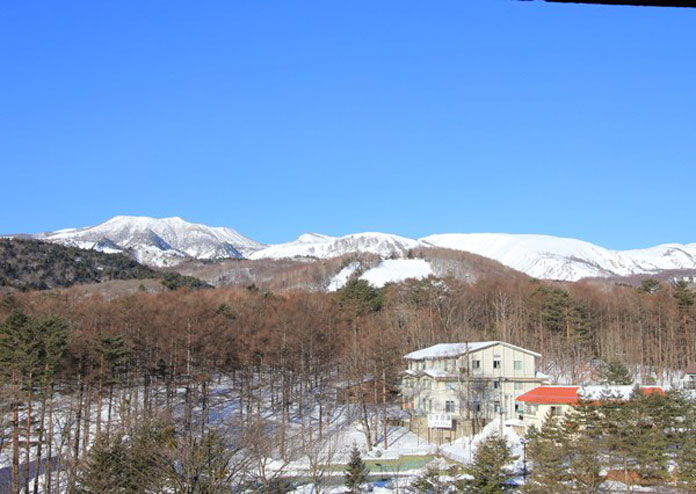
3 weeks after the volcano went off Kusatsu is pretty as a picture © Carmen Price
On a beautiful sunny spring day with fresh snow covering the ash and rocks from the eruption you would never know the Kusatsu eruption had happened. Skiing around with the patrollers, who were training with Japan’s top Ski Patroller, we had a lot of fun. I spotted a figure climbing high up on the slope above the lift and asked if you could hike/ski out there. The guys looked and laughed, it was a Japanese serow – or goat-antelope! Sightings are rare, especially in winter, so we got lucky.
When it was open to the top Kusatsu boasted a 926m vertical off the lifts, and an 8km run back to the bottom. Plus you could ski or snowshoe 2km to the crater lake at Shirane. The base is 1200m, a relatively high altitude for Japan, so snow quality and consistency is good.
The upper area has been permanently closed now. So the skiing is mostly easy beginner and cruisy intermediate level, with wide open slopes at the base just above town that are perfect for families with young kids and other beginners.
With fresh snow you can still find some powder lines too, but there’s not much here for better skiers and boarders. But it’s so worth visiting anyway that shouldn’t really matter – come for a night or two to see the amazing town and enjoy the onsens.
There are plenty of other ski areas not far away, from Manza Onsen which is easy day trip distance with direct bus services, to the Minakami areas like Tanigawadake Tenjindaira, where you can find some of the best tree and backcountry including serious alpine line terrain in the country, so adding a couple of nights here too is no big deal.
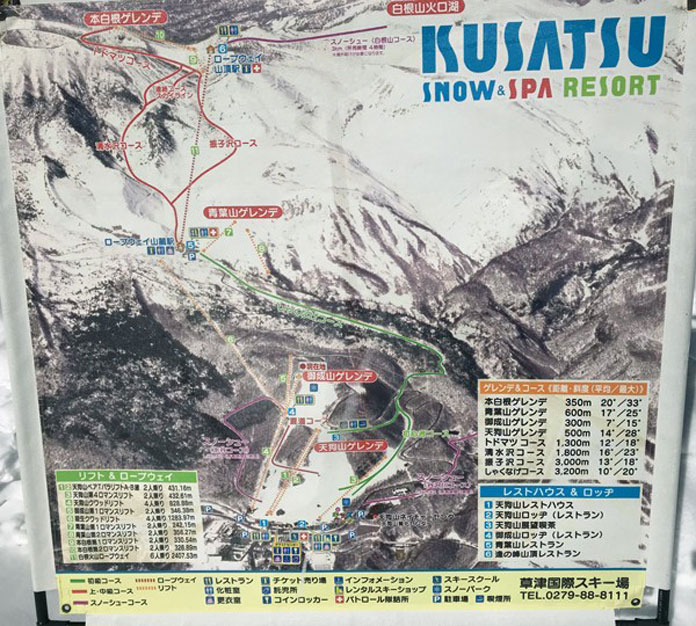
The top left area on the map was the affected zone at Kusatsu that remains closed © Carmen Price
Getting to Kusatsu
It’s easy to self drive to Kusatsu, and around Gunma generally a car is handy. From Tokyo by road to Kusatsu is 163km. Take the Kan-Etsu Expressway to Shibukawa-Ikako interchange 103km, then Route 353 to Nagonohara (Otsu) 50km, then Route 292 to Kusatsu 10km.
By rail from Tokyo take the Joetsu or Nagano shinkansen to Takasaki, 50 minutes, then JR Agatsuma line to Naganoharakusatsuguchi, 1 hour 20 minutes, then 25 minutes bus from the station to Kusatsu.
Or its actually simpler to go to Karuizawa, 70 minutes on the Hokuriku shinkansen and get the Kusakuru-Kotsu-Seibu Kanou Bus to Kusatsu, 1 hour 16 minutes. This is great for combining with Nagano areas like Hakuba, Shiga and Madarao, or Niigata ones like Nozawa, Myoko and Lotte Arai Resort.
There are quite a few buses including frequent express services from Tokyo Shinjuku and Shibuya, fare Y2,200 adults Y1,100 child to primary school, check details/book at www.kkkg.co.jp/
Both routes are available with a JR Tokyo Wide area rail pass – this 3 day consecutive pass costs Y10,000 and you could use it to come in from the airport, then a day trip to Mt Fuji, then head to Kusatsu for example.
Buses from Tokyo Station take just over 4 hours, one way fare Y3,450 can pre book here jr.buskanto.co.jp/
Kusatsu location map
Where to stay Kusatsu
There’s a huge variety of accommodation here, from cheap pensions and ryokans to superb resort hotels.
For guest house Kindai Pension is very comfortable with French cuisine from Y9,750 – 15,500 including tax.
We stayed at and highly recommend the Kusatsu Now Resort, which boasts excellent rooms, a magnificent buffet for breakfasts and dinners, quality onsen – including several private session ones for guests – and fast access to the skiing as the mountain base is just 200m above the hotel with regular shuttles there and to the centre of town. Rooms from Y13,000 – Y35,000.
More info on Kusatsu and Gunma
When you are there the tourist info office has plenty of useful info in the bus terminal building.
For Kusatsu Onsen info check the official English language Tourism site here
Gunma Prefecture’s English language Facebook has plenty of info too.
Gunma Prefecture Gunma Tourism site
Accommodation bookings and packages
Japan Snow Holidays Japanholidays.com.au
Travelplan Gunma deals/info
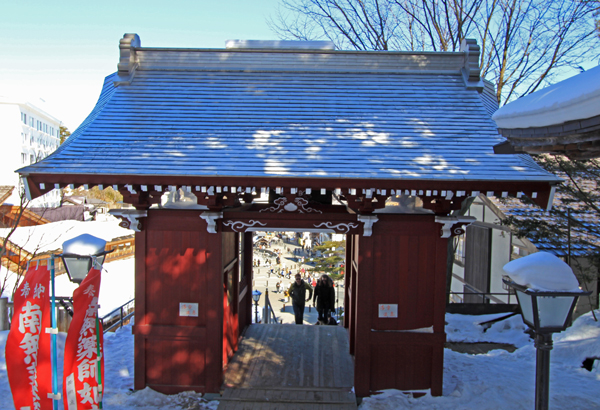
Climb the steps up to the Kosenji Temple for a great view back over the plaza at Kusatsu © Owain Price


